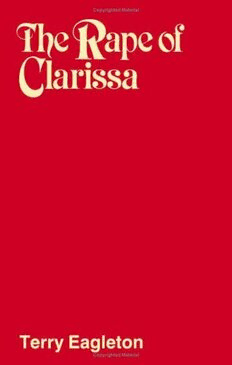
The Rape of Clarissa: Writing, Sexuality and Class Struggle in Samual Richardson PDF
Preview The Rape of Clarissa: Writing, Sexuality and Class Struggle in Samual Richardson
The Rape of Clarissa For Alan Ward TOV KpCLTOVVTCL jUdA^d/CClx; #e(k 7rpoaco#ei> ei)juei>co<; 7rpoa8epKerat. The Rape of Clarissa Writing, Sexuality and Class Struggle in Samuel Richardson TERRY EAGLETON University of Minnesota Press • Minneapolis Copyright ©1982 by Terry Eagleton All rights reserved. No part of this publication may be reproduced, stored in a retrieval system, or transmitted, in any form or by any means, electronic, mechanical, photocopying, recording, or otherwise, without the prior written permission of the publisher. Published by the University of Minnesota Press 2037 University Avenue Southeast, Minneapolis, MN 55414. Published simultaneously in Canada by Fitzhenry & Whiteside Limited, Markham. Printed in the United States of America. Second printing, 1986 ISBN 0-8166-1204-8 0-8166-1209-9 (pbk) The University of Minnesota is an equal opportunity educator and employer. Contents Preface vii Introduction 1 The Rape of Clarissa 40 Postscript 95 Index 103 This page intentionally left blank Preface The German critic Walter Benjamin dismissed the view that all literary works were equally 'readable' at all times. For Benjamin, a work may fall into obscurity for centuries, only to be suddenly reactivated as the history to which it belongs flashes into freshly relevant relationship to our own epoch. The task of criticism, as Benjamin saw it, was to 'blast open the continuum of history', forging conjunc- tures between our own moment and a redeemed bit of the past, imbuing works with retroactive significance so that in them we may better read the signs of our own times.1 The wager of this book is that it is just possible that we may now once again be able to read Samuel Richardson. This was not on the whole possible for the nineteenth cen- tury, for which Coleridge's damning judgement was largely decisive: 'His mind is so very vile a mind, so oozy, so hypo- critical, praise-mad, canting, envious, concupiscent.'2 It would seem an unenviable task to try and redeem that. Yet Coleridge's remark was made in the context of admiration; and there are those who have claimed Clarissa as the greatest English novel. Though I suppose one should be sceptical of such transcendental judgements, it may still 1 See my Walter Benjamin, or Towards a Revolutionary Criticism (London, 1981), especially part 2, 3. 2 Anima Poetae (London, 1895), p. 166. viii Preface be the case that Clarissa can now become a great novel for us. If this happens, it will be because certain new ways of reading developed in our own time, closely related to the nature of our own history and to the political interests of a Richardson, have made his texts available in a new way. There are three such methods of reading conjointly used in this book. The first arises from the various post- structuralist theories of textuality, of vital relevance to an author as obsessed as Richardson was by the act of writing. The second is a feminist and psychoanalytical perspective: if Richardson may once again become readable, it will be in large measure because of the women's movement. Two facts in particular seem to have denied Clarissa recognition as arguably the major feminist text of the language. The first is that, greatest English novel or not, it is certainly the longest, and so has been little read; the second is that its author was male. Whether my account of the novel can outweigh these embarrassments is for the reader to decide; I would be glad enough if the book simply served to make people want to read Richardson and argue with my case. As for psychoanalysis, I suppose I must apologize for entering upon this terrain, which the English have always found a little unnerving. It is customary for Richardson critics to tip their hats gravely in the direction of the un- conscious; it is simply any systematic spelling out of the matter that they seem to find a little indecent. The book's third method is that of historical material- ism. The contemporary resurgence of Marxist criticism, with its interest not only in class struggle but in literary modes of production, is another factor which might allow us to read Richardson with new insight. The eighteenth century has long been the preserve of literary conservatism, rarely penetrated by Marxist criticism, and one purpose of my book is accordingly to appropriate a little of this patch. My second apology, then, is that I entirely lack what would appear to be one of the chief credentials for Preface ix discussing the eighteenth century, namely a nostalgic urge to return to it. I am not out to suggest that Richardson was a radical even in his own society's terms, let alone in ours; much of his ideology strikes me as repellent and irredeemable. I am concerned rather with his position as intellectual and literary producer within an emergent class, and with what socialists — for whom that class is today the enemy — may learn from that location. But I am also concerned with what seem to me the genuinely sub- versive effects of Clarissa, which far exceed its author's intentions. I am particularly grateful to Toril Moi, whose influence on this book is deep and pervasive. T. E.
